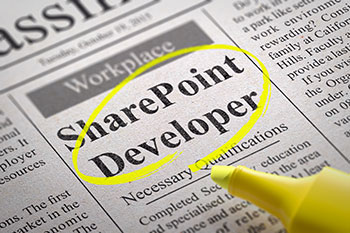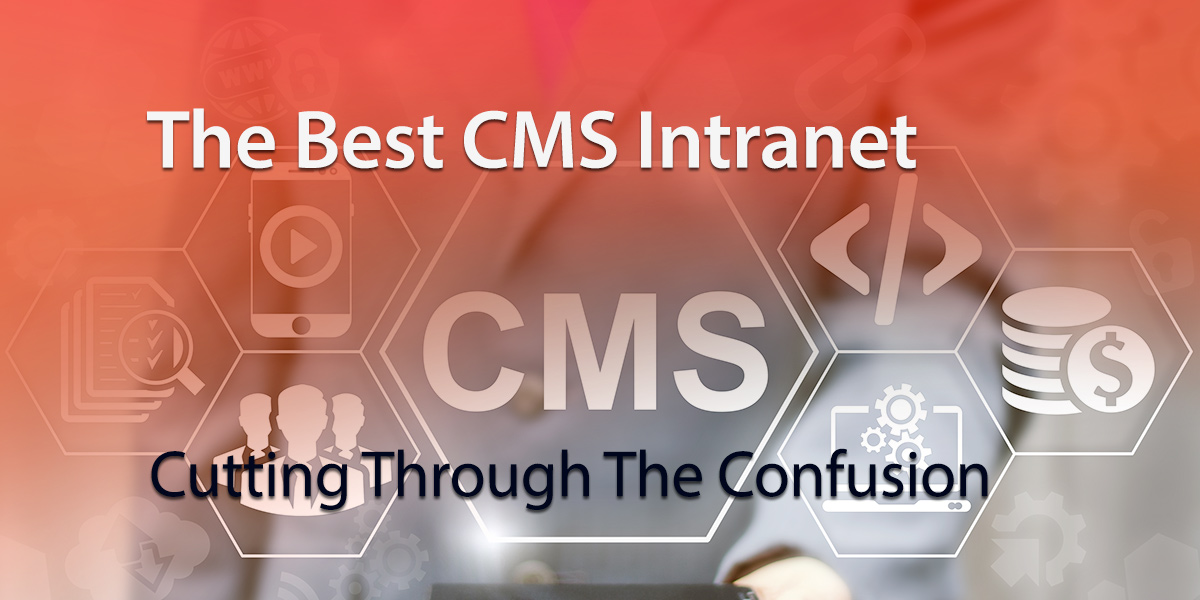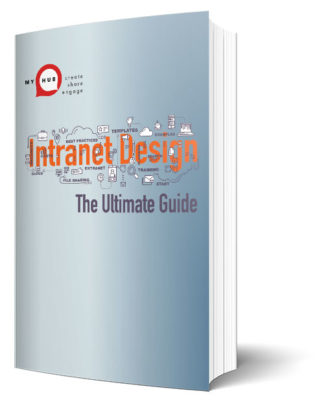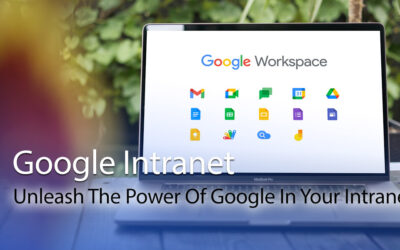Choosing the best CMS intranet system can be confusing and overwhelming. Your business has to weigh up several different factors before deciding on the perfect fit for your organization. However, there so many options to choose from. So, how do you know which of the many providers has the best offering? What are the features you should be looking for? Thankfully, this post unpacks all you need to know. From essential features to the pros and cons of the big names, this article takes you through the steps involved in choosing a CMS intranet provider.
What Is A CMS Intranet?
In simple terms, an intranet is your company’s internal website. Employees use it to communicate with each other and access the information needed to perform their daily jobs. CMS (short for content management system) is the software used to create, edit, share and manage your digital content.
CMS intranets allow for user-generated content. Unlike old-style corporate intranets where the IT department was needed to make an update, CMS intranets are simple to use. Responsibility for creating and updating content is shared throughout the business. The result? A dynamic, engaging intranet that meets employees’ needs.
Are you looking for a CMS intranet that delivers a delightful rather than dull employee experience? Then here are the 12 essential features every CMS intranet must have in place.
12 Must-Have Features For CMS Intranets
Although your company’s specific needs will be unique, there are several key features that all good CMS intranets should have. So, let’s take a look at what those are.
1. Easy To Use
Staff should naturally be able to access and navigate their way around the system, encouraging them to use it more. And ease of use also helps to keep training costs down.
2. Quick To Get Going
The best CMS intranet shouldn’t require technological wizards to install it. Instead, your average business user should be able to get it up and going without too much effort.
3. Simple To Manage
Ongoing easy management is just as important as initial setup. The last thing you need is a CMS intranet that is clunky and difficult to manage. Look out for a solution that offers bulk management tools to add, enable and disable users. And be sure to check how easy it is to set administration rights and page permissions. You shouldn’t have to work too hard to maintain your CMS intranet site.
4. Engaging Design And User Interface
The design can make or break your CMS intranet. Research tells us that users prefer beautiful-looking products over ones that are usable but not so attractive. A clean, slick, modern design will drive adoption and makes for an enhanced employee experience. Nowadays, employees use a variety of devices to complete work tasks. Double-check that the CMS intranet is responsive across all devices, including tablets and smartphones.
5. Strong Security
Nothing is as essential as your company’s security. So much so, it’s not worth compromising in this area. Whether it’s private personnel data or commercially sensitive company information, safeguarding your CMS intranet is vital. There are enough solutions in the marketplace that will ensure high levels of security for your system. Make sure your choice of CMS intranet is secure by default.
6. Advanced Navigation And Search Capabilities
Employees need to be able to source company information as quickly as possible. Intuitive site navigation will assist in that task. However, your CMS intranet should also have a smart search where staff can locate data by several fields, including tags and keywords. An effective search function saves valuable time and effort. And it will also increase intranet adoption.
7. Customization
Every company’s needs are different and unique. So select a CMS intranet that offers customization. Your intranet should reflect the company brand with your logo, corporate colors, and relevant images. And you should also be able to finetune the CMS intranet’s features and functions to suit your requirements.
Some CMS intranet solutions take customization to another level with personalization. This feature allows you to tailor content by role, function, or location. A personalized CMS intranet mimics the kind of experience users have on social media and e-commerce sites. And many employees have come to also expect it in the workplace.
8. Easy Integration With Other Enterprise Platforms
Does the CMS intranet allow for easy integration with other enterprise platforms used by your business, such as Salesforce or Google Workspace? The best CMS intranets allow for seamless access with a single sign-on. That way, staff are not juggling multiple screens, apps, and passwords. To improve productivity, you want a CMS intranet that brings all these tools together under one virtual roof.
9. Scalability
You will want to select a CMS intranet that’s capable of growing alongside your business. Make sure you are not limited to a certain number of users or data storage. And double-check that you can easily add modules, pages, and features as your needs evolve.
10. Intranet Analytics
Measuring and tracking how your CMS intranet is performing over time is vital to ongoing success. Does your CMS intranet come with integrated analytics? At a minimum, you need to know how employees interact with content, which content is the most popular, and how content is accessed and shared.
11. Social Engagement
The best CMS intranets include social engagement features as standard. Features like instant messaging, liking, sharing, and commenting on content, plus team and activity walls support employee engagement. And they also make a difference in the context of remote working and hybrid working models.
12. Ongoing Support
Managing updates and troubleshooting doesn’t need to be a headache. Be sure to select a provider who not only sets up your software but maintains and updates it regularly. An added bonus is a provider who offers troubleshooting support on an ongoing basis.
Benefits Of A CMS Intranet: Deciding What Is Important

Most businesses are drawn to a CMS intranet solution in response to a business pain point. The main driver will vary from company to company. However, here’s an overview of the benefits a CMS intranet has to offer to help you identify what’s important to your business.
Improved Information Sharing And Engagement
As a centralized, go-to hub, the CMS intranet makes information sharing and management easy. Staff know exactly where to go to access all the tools and up-to-date data they need to get the job done. The CMS intranet is the organization’s single voice of truth.
Increased Collaboration
With hybrid models of working involving distributed teams of office and home-based employees, digital collaboration is crucial. The CMS intranet comes with a range of integrated tools that facilitate collaboration, including:
- instant messaging
- shared workspaces, forums, and blogs
- notifications and @mentions
- corporate calendars
- project activity walls.
Enhanced Internal Communications
More engaging and interactive than traditional communication channels, CMS intranets enhance organizational communications. For example, newsfeeds, blogs, team chat, surveys, and polls encourage multi-directional communications across the business. The result? Swifter, more agile decision-making, plus a more informed and engaged workforce.
Better Rates Of Employee Engagement
Engaged employees are more loyal and more productive. Research from the likes of Gallup and Deloitte have confirmed this over many years. CMS intranets simultaneously address several critical drivers of employee engagement, such as:
- giving employees a voice with two-way communication channels
- making information more accessible
- easy sharing of knowledge
- promoting company culture and a shared sense of purpose
Improved Productivity And Efficiencies
Whether it’s reductions in printing and paper costs to less time wasted sourcing information, CMS intranets make a difference. Furthermore, the platform’s automated workflows allow for speedier, more efficient business processes.
CMS Intranet Options
Having figured out the areas of your business you want to improve with a CMS intranet. Now you can look at the different platforms. Here’s some guidance on how to assess the suitability of the various solutions and providers in the marketplace.
When it comes to choosing the best CMS intranet provider for your company, you are not starved for choice. The marketplace offers a range of quality providers. Below we look at some of the popular options, running through the pros and cons to enable an informed decision.
SharePoint

While the familiar Microsoft feel can be seen as an advantage, there are limited opportunities for customization. And so, your SharePoint CMS intranet can feel more like a Microsoft intranet than your own company one.
Another concern around SharePoint is that it requires a decent amount of technical expertise to set up. As a result, your average employee generally won’t find it easy to use, and some organizations have struggled to utilize its features beyond document management. Many have had to call in external help to get the most out of the platform, resulting in extra costs.
WordPress
Famous among bloggers, few know that WordPress can also be used as an intranet CMS. WordPress boasts of its super quick install, which, combined with a simple interface, makes it easy to use. Plus, it can be extended by any number of plug-ins to increase its features, with media and image support built-in.
Unfortunately, large organizations have found WordPress to be pretty restrictive due to the nature of its core template. Often numerous plug-ins need to be installed to satisfy your requirements. And with 55,000 to choose from, this can be arduous and time-consuming. Plus, premium plug-ins often come with a price tag.
Security concerns have also plagued WordPress, with hacking and SQL injections occurring in the past. Some of these have been addressed in recent updates. However, users are responsible for their own updates to maintain security levels. And some issues still remain with plug-ins developed by third parties.
Drupal
Also well known in the CMS intranet world is Drupal. Following a similar open-source model to WordPress, Drupal is free to download and install.

However, Drupal suffers from some of the same cons as WordPress. The large number of modules makes customizing and creating a suitable system time-consuming and complicated. Many organizations have found this a deterrent, and the process often involves engaging additional IT resources to execute properly.
Furthermore, Drupal has also had some security issues involving malware and cyberattacks. As a result, you will need to supervise and monitor your Drupal CMS intranet closely. And you may also need to invest in additional security measures to safeguard your company data.
Hosted Online CMS Intranets
Combine all of the core features and necessary functionality of CMS intranet, take away the weaknesses present in other providers, and you have hosted online CMS intranets. All your essential business tools are in one location, without any pesky plugin-ins. With hosted online intranets, you can expect:
Document management systems
- Company calendar
- Collaborative workspaces
- Forms workflow
- Advanced search capabilities
- Staff directory
Incredibly simple—just log on, and begin creating content. No installing or downloading software, no plug-ins or add-ons. Just a simple interface that is easy to use and feels natural for your staff.
You can expect to receive ongoing support from most intranet hosting companies. This means that operational issues are no longer a big drama—help is a simple phone call away instead of trawling through forums looking for an answer. Not to mention that all updates are done for you automatically, and all security protection will be maintained automatically, free of charge. Your company will have the best software to ensure maximum running time and safety.
The Best CMS Intranet Choice Is Clear
Having seen what the market has to offer, it’s clear that hosted online solutions provide the best of both worlds. A single platform for sharing and accessing information, easy to set up and use, all with integrated functionality.
If you’re ready to implement a CMS intranet with proven effectiveness, contact us for a free demo or 14-day trial. If you are short on time, we also provide a range of intranet design services for companies who need help setting up sections, pages, forms, and users. We’ll work with you to design and deploy the best CMS intranet. And you can look forward to increased communication, collaboration, and engagement throughout your business.
An effective intranet design isn’t just about the initial template or the first pieces you put together. You need an intranet designed to fit your business’s unique needs not only when it’s first deployed but every day to follow. We’re here to help provide the basic template, ongoing support, and the time-tested solutions you need to make the most of your intranet.
CMS Intranets: Additional Reading
If this post has whetted your appetite for more, then the MyHub blog has a wealth of additional support. Here’s a quick summary of several relevant posts you may be interested in reading.
- Intranet Development: Making Life Easier For An Intranet Developer: Aimed primarily at web developers, this post provides a handy step-by-step guide to setting up a CMS intranet. You will learn about requirements gathering, information architecture, and design elements. Plus, the importance of testing your prototype CMS intranet. The post compares the DIY approach to using pre-built CMS intranet templates. The advantages of intranet templates are made clear. All the hard work has already been done for you, including testing, development, and design. Easily customizable CMS intranet templates are a fantastic time-saver. So, your intranet can be up and running in no time.
- Future-Proofing Your CMS Intranet: How To Maximize the ROI: A CMS intranet is a considerable investment for any business. And having spent all that time, effort, and resources, you want to ensure you get maximum ROI. This post sets out several easy-to-implement ways to future-proof your intranet. And helps ensure your CMS intranet remains fit for purpose long into the future.
- Make Your CMS Intranet Content Valuable And Fun: If you are looking for ideas on creating fun and engaging intranet content, check out this post. Sourcing content that resonates with staff and leaves them wanting more is a challenge. However, the tips in this post will help you. And there’s also guidance on how to measure the impact and success of content on the CMS intranet.
- CMS Intranets: How To Improve Internal Communications In Your Organization: Improving internal communications is often the driving force behind the decision to implement a CMS intranet. Read this post to find out how to leverage your CMS intranet’s capabilities to improve internal communications. Learn how to break down information silos with multi-directional communications. And how to create an engaging newsfeed. Nowadays, internal communications are more challenging than ever. Read this article to explore how your CMS intranet offers the solution.
CMS Portal: Streamline Processes & Enhance Patient Care With A Healthcare Intranet: This post explores the potential of CMS intranets within healthcare settings. Patient care and treatment are the top priority for healthcare providers. However, so too is delivering cost-effective and efficient services. Discover how CMS intranets support onboarding, knowledge management, communications, and information sharing. The post also has some ideas on how you can use your CMS intranet to gather patient feedback.
- CMS Intranet Solutions: 4 Drivers To Consider When Making A Choice: For most companies, four key drivers influence their selection of CMS intranet provider: Budget, Ease of use, Easy to manage, safe and secure. This post examines the performance of cloud CMS intranets against the main drivers. Find out why cloud CMS intranets are the top choice for any business.
- CMS Portal: 4 Ways To Improve Customer Experience Via Your Intranet: The benefits offered by CMS intranets are not just apparent internally. As this post explores, the CMS intranet also impacts the customer experience. Find out how CMS intranets improve customer service by giving customer-facing staff the tools needed to provide quick, knowledgeable, responsive service. Up-to-date product and customer information are available 24/7 at workers’ fingertips. Furthermore, you can use the CMS intranet to collate, analyze and share customer feedback for continuous improvement.
- CMS Intranets: Making The Right Choice: This post will support you in making the right choice of CMS intranet. All the big players are examined, including SharePoint, WordPress, and Drupal. The performance of these platforms is then compared against hosted online CMS intranets. Essential reading if you are unsure of the best option, this post will help you make an informed selection.
- 6 CMS Intranet Resources You’ll Need to Consider: Before you go ahead with implementing a CMS intranet, there are several resources you need to pull together. Identifying these resources in advance helps ensure success. This post provides helpful tips and advice on the following intranet resources: Internal implementation team, Your budget, Time commitment, Stakeholder communication, Workforce training and upskilling, Post-implementation resources. It’s essential to take a planned, strategic approach to implementation. And this post will help you be prepared.
- 11 Features Your Employees Look For in a CMS Intranet: When selecting and implementing your CMS intranet, it’s likely your primary focus will be on the organization. It’s easy to lose sight of the needs of end-users – your employees. This post identifies 11 features that are on top of employees’ wish lists. And if your CMS intranet doesn’t tick all the boxes for employees, it’s unlikely to be adopted. Make sure your CMS intranet has all the features identified. That way, your selection will simultaneously meet business objectives and employees’ needs. And that’s the ultimate recipe for success.
- CMS Intranet Software: Unleash The Power: Our final selection includes plenty of helpful tips and advice on selecting the best CMS intranet for you. This post helps you focus on what’s really important for your business. It might be the need for ongoing provider support or a cost-effective platform. Whatever the case, the post assists you in making the best choice. Your business can then unleash the power of CMS intranets and start enjoying the many benefits.




 Document management systems
Document management systems





